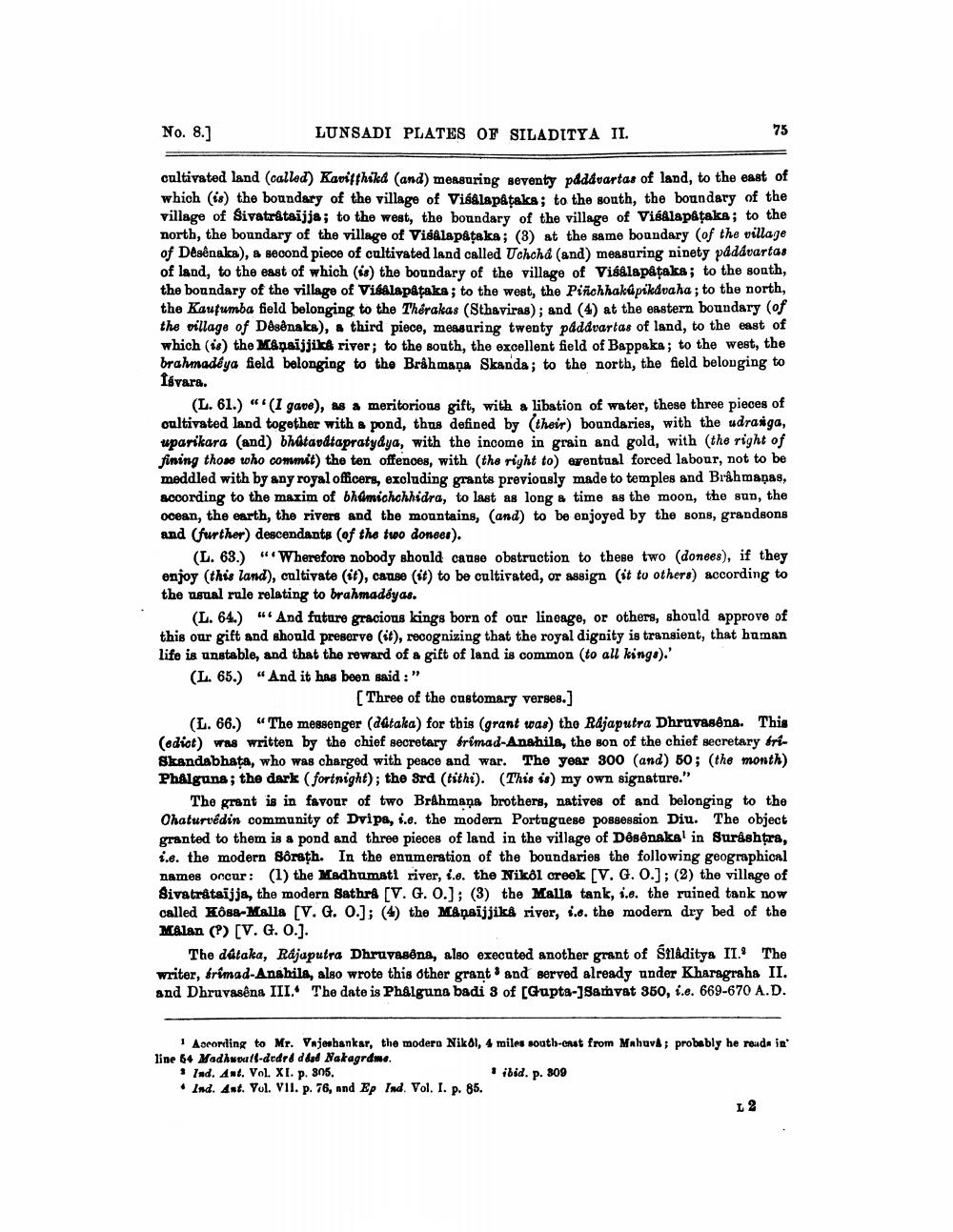________________
No. 8.]
LUNSADI PLATES OF SILADITYA II.
cultivated land called) Kaviffhika (and) measuring seventy oddávartas of land, to the east of which is the boundary of the village of Visalapätaka; to the south, the boundary of the village of Sivatråtaijja; to the west, the boundary of the village of Visklapataka; to the north, the boundary of the village of Visalapätaka; (3) at the same boundary (of the village of Desênaka), a second piece of cultivated land called Uchcha (and) measuring ninety padávartas of land, to the east of which (is) the boundary of the village of Visalapätaka; to the south, the boundary of the village of Visalapätaka; to the west, the Pinchhakúpikdvaha; to the north, the Kaufumba field belonging to the Therakas (Sthaviras); and (4) at the eastern boundary (of the village of Dogênaka), a third piece, measuring twenty paddvartas of land, to the east of which is the Mapaijjika river; to the south, the excellent field of Bappaka; to the west, the brahmadêya field belonging to the Brahmana Skanda; to the north, the field belonging to Isvara.
(L. 61.) “'(1 gave), as a meritorious gift, with a libation of water, these three pieces of cultivated land together with a pond, thus defined by their) boundaries, with the wdranga, uparikara (and) bhatavdtapratydya, with the income in grain and gold, with the right of fining those who commit) the ten offences, with the right to) aventual forced labour, not to be meddled with by any royal officers, excluding grants previously made to temples and Brahmaņas, According to the maxim of bhúmichchhidra, to last as long & time as the moon, the sun, the ocean, the earth, the rivers and the mountains, (and) to be enjoyed by the sons, grandsons and further) descendants of the two doneer).
(L. 63.) ""Wherefore nobody should cause obstruction to these two (donees), if they enjoy this land), cultivate (it), cause (it) to be cultivated, or assign it to others) according to the usual rule relating to brahmadéyas.
(L. 64.) "* And future gracious kings born of our linoage, or others, should approve of this our gift and should preserve (it), recognizing that the royal dignity is transient, that human life is unstable, and that the reward of a gift of land is common (to all kingo).' (L. 65.) "And it has been said :"
[Three of the customary verses.] (L. 66.) «The messenger (adtaka) for this (grant was) tho Rdjaputra Dhruvasêna. This (edict) was written by the chief secretary Srimad-Anahila, the son of the chief secretary briSkandabhata, who was charged with peace and war. The year 300 (and) 50; (the month) Phålguns; the dark (fortnight); the Srd (tithi). (This is) my own signature."
The grant is in favour of two Brahmaņa brothers, natives of and belonging to the Chaturvédin community of Dvipa, i.e. the modern Portuguese possession Diu. The object granted to them is a pond and three pieces of land in the village of Dêsênakal in Surashtra, i.e. the modern sôrath. In the enumeration of the boundaries the following geographical names orcar: (1) the Madhumati river, i.e. the Nikol creek [V. G. 0.]; (2) the village of Sivatrátaijja, the modern Sathra [V. G. O.); (3) the Malla tank, 1.e. the ruined tank now called KÔ8a-Malla (V. G. 0.]; (4) the Manaijjika river, i.o. the modern dry bed of the Malan (?) [V. G. 0.].
The dataka, Rajaputra Dhruvasna, also executed another grant of SriAditya II. The writer, frimad-Anahila, also wrote this other grant and served already under Kharagraha II. and Dhruvasêna III. The date is Phålguns badi 3 of [Gupta-]Samvat 350, i.e. 669-670 A.D.
Ascoring to Mr. Vnjesbankar, the modero Nikól, 4 miles south-east from Mahuva; probably he rende in line 64 Madhuoati-dodré d&d Nakagrdme. • Ind. Ant. VOL. XI. p. 305.
ibid. p. 809 • Ind. Ant. Yol. VII. p. 76, and Ep Ind. Vol. I. p. 85.




